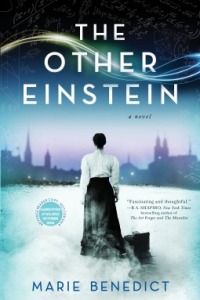
DESCRIPTION:
A vivid and mesmerising novel about the extraordinary woman who married and worked with one of the greatest scientists in history.
What secrets may have lurked in the shadows of Albert Einstein’s fame? His first wife, Mileva “Mitza” Marić, was more than the devoted mother of their three children—she was also a brilliant physicist in her own right, and her contributions to the special theory of relativity have been hotly debated for more than a century.
In 1896, the extraordinarily gifted Mileva is the only woman studying physics at an elite school in Zürich. There, she falls for charismatic fellow student Albert Einstein, who promises to treat her as an equal in both love and science. But as Albert’s fame grows, so too does Mileva’s worry that her light will be lost in her husband’s shadow forever.
A literary historical in the tradition of The Paris Wife and Mrs. Poe, The Other Einstein reveals a complicated partnership that is as fascinating as it is troubling.
What secrets may have lurked in the shadows of Albert Einstein’s fame? His first wife, Mileva “Mitza” Marić, was more than the devoted mother of their three children—she was also a brilliant physicist in her own right, and her contributions to the special theory of relativity have been hotly debated for more than a century.
In 1896, the extraordinarily gifted Mileva is the only woman studying physics at an elite school in Zürich. There, she falls for charismatic fellow student Albert Einstein, who promises to treat her as an equal in both love and science. But as Albert’s fame grows, so too does Mileva’s worry that her light will be lost in her husband’s shadow forever.
A literary historical in the tradition of The Paris Wife and Mrs. Poe, The Other Einstein reveals a complicated partnership that is as fascinating as it is troubling.
REVIEW:
You wouldn't believe the state of excitement that overcame me when I finally got my hands on this book. I was jumping around, doing my little happy dance and beaming little balls of glitter all over my kitchen. There are no words that could even vaguely give at least a poor image of the way I looked on the verge of what I sincerely considered the book of the year.
There is no point in telling you that I curled up into my reading nook and started reading. But as soon as I reached page two I knew something was off. I couldn't connect with the lines as I usually do, there was something seriously out of place. As I kept on reading it became more and more visible, this was definitely not what I expected from The Other Einstein.
The mechanics of the novels were crippled in a way I cannot really explain. The actual conflict was pushed so far ahead in the novel that by the time I actually reached it, it felt out of the place and pointless. This left me feeling cheated, and definitely didn't satisfy my genuine interest in the book. I haven't signed up for a crippled love story, I wanted my scientific conflict, my gender struggle, my strong female character.
Instead I found myself frustrated at best: Mileva was like a toy that was pushed around without any power of her own. She was a smart, but a sad doll. I couldn’t understand what Mileva saw in Albert which made Benedict’s emphasis of their union rather awkward. The issue was exacerbated further by Benedict’s interpretation of Albert. The famed scientist is difficult at best, but her portrayal is so far from his cultural legacy that it alienates those with any sort of appreciation for him.
The saddest part of the whole narration was the suffocating feeling that it left you with. The injustices Mileva faced are extraordinary, but Benedict’s presentation is nothing short of plain. Instead of being able to embed a feeling of whatever emotion, Benedict managed to kill them all, leaving you numbed and unattached. Not once did I feel the sting of unshed rears, even in scenes made for an emotional response from the reader. Intellectual responses—anger at Einstein’s behaviour for example, or annoyance at Mileva’s strange decisions, yes, but not empathy for the characters.
The saddest part of the whole narration was the suffocating feeling that it left you with. The injustices Mileva faced are extraordinary, but Benedict’s presentation is nothing short of plain. Instead of being able to embed a feeling of whatever emotion, Benedict managed to kill them all, leaving you numbed and unattached. Not once did I feel the sting of unshed rears, even in scenes made for an emotional response from the reader. Intellectual responses—anger at Einstein’s behaviour for example, or annoyance at Mileva’s strange decisions, yes, but not empathy for the characters.
All I can say is, I was deeply disappointed with The Other Einstein.


No comments:
Post a Comment